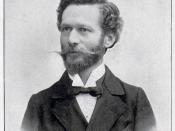"Was it weird growing up having deaf parents?" "Why aren't you deaf?" "How did you learn how to talk?" "Can your parents talk?" "Is it quiet in you house?" "How do they use the phone?" When most people find that my parents are both hearing impaired, their first reaction is to automatically have sympathy for me due to this perceived disadvantage. Although I have come across the inventible obstacles, I don't view the situation as a problem, only as an opportunity that God has placed in my life for a purpose.
At an early age I learned what it meant to appreciate all that was given to me. Gifts which many take for granted I cherish. From all of the so-called "hardships" that I have endured, somehow I have developed not only an open mind, but also an open heart. Exposure to dealing with this professed disability has given me the ability to see beyond that which the populace generally sees.
"Perfect" people who lead "perfect" lives often make judgments on others. I consider that a more critical disability than countless physical impairments. Becoming conscious of how people react to my parents has enabled me to distinguish how much of a deficit first impressions can be. Not only has this bestowed a unique opportunity to have a lucid, understanding perspective of the lives and community of the deaf, but it has also made me become a compassionate, empathic person towards everyone. Although I am by no means perfect, this experience has helped shed light on the world in general.
No, it wasn't weird growing up having deaf parents, and still isn't. Hearing impairment is not always genetic. My parents taught me how to speak. Yes, my parents are able to speak, just not very clearly. My household is actually...



Hearing Life in a Deaf World...
Substantial room for more depth. This is an interesting paper that kept me reading, I just wish there was more because it was so interesting and ended adruptly. But overall a fine piece.
5 out of 5 people found this comment useful.